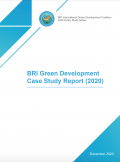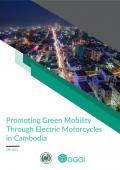While the social and economic effects of COVID-19 are likely to last for many years, careful recovery planning can mitigate negative long-term impacts. For Indonesia, reassessing its reliance on coal for electricity would be an important step in the country’s green recovery.

This study utilizes an innovative integrated economic and environmental model (IEEM) coupled with land use land cover (LULC), and ecosystem service models (IEEM+ESM) to understand how various policy interventions could affect economic, poverty amelioration and environmental outcomes in Rwanda.
This is the third Environmental Performance Review of Ireland. Ireland’s progress in delinking the economy from environmental pressures has been uneven in the last decade. Encouraging businesses and households to take action is key.
Lao PDR policy makers have recognized the economic potential of protected areas and seek to develop these sites as a focus of the National Socio-Economic Development Plan 2021-2025 and the 2030 National Green Growth Strategy, given the globally unique natural heritage of Lao PDR.
Pesticides management is important for sustainable agriculture and green growth. Sound pesticides management and Integrated Pest Management (IPM) in particular are widely acknowledged as important mechanisms to mitigate pre- and post-harvest losses and to achieve sustainable agricultural intensification.
This report shares the analysis on the effects of the coronavirus disease 2019 (COVID-19) in the agri-food system in Liberia based on the assessment conducted during July–September 2020. The Food and Agriculture Organization of the United Nations (FAO) is implementing a project to contribute to data collection and analysis linked to COVID-19 to inform evidence-based programming in selected countries.
In the past decade, greenhouse gases and air pollutant emissions, municipal waste generation, energy and material consumption, and water abstractions decreased, However, Belgium's performance remains insufficient to halt biodiversity loss and to alleviate the growing pressures of demographic development, urbanization and intensive agricultural practices.

Tourism brings economic development as well as cultural and social benefits, but its growth has also significantly increased greenhouse gas (GHG) emissions, pressure on energy and water resources, and the creation of waste. This poses a threat to the environment and to Saint Lucia as a viable and desirable tourism product. This action plan is for policymakers, destination planners and managers, and private sector industry stakeholders. It explains how to make the accommodation value chain more sustainable, reducing the negative impacts of tourism, such as marine pollution and environmental degradation, and its high demands on natural resources.

This report showcases 13 projects covering eight fields, namely, biodiversity and ecosystem, clean energy, clean water, sustainable transportation, solid waste treatment, sustainable consumption and production, green buildings, and corporate social responsibility.

Cambodia is one of the fastest-growing economies in Southeast Asia, with an average annual GDP growth rate of 7.7% between 1995 and 2018. The overall objective of this study is to develop an investment project proposal that can facilitate the deployment of electric motorcycles (EM) in Cambodia and contribute to the reduction of GHG emissions in the transport sector
